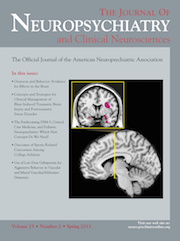Atrial Flutter in a Patient With Alzheimer Dementia Treated by Rivastigmine
To the Editor: Cholinesterase inhibitors may cause bradycardia, atrioventricular block, QT prolongation, ventricular tachyarrhythmia, or even torsades de pointe. We present the case of a female patient with Alzheimer’s dementia whose atrial flutter (AF) was linked to the use of rivastigmine.
Case Report
The patient was a 66-year-old widowed woman who developed cognitive decline, memory impairment, and mildly impaired ability of activity of daily living, associated with neuropsychiatric symptoms for 1–2 years before her first visit to our geropsychiatric clinic. She revealed exacerbated psychomotor agitation and aggression to the nursing home staff, with the delusional belief that somebody in the nursing home stole her laxative medications and money several days before the visit. She was therefore admitted to our inpatient ward. She had type 2 diabetes mellitus, with 10 units of Mixtard insulin injection for control, and no other significant medical, psychiatric, or family history. Her laboratory work-up, including complete blood count, liver, renal, and thyroid panels, vitamin B12 and folic acid levels, revealed unremarkable findings. The brain computerized tomogram showed cortical atrophy and compatible ventricle dilatation. The baseline electrocardiogram was normal sinus rhythm. Her Clinical Dementia Rating Scale was 1.0 and the Mini-Mental State Exam was 20. Based on the diagnosis of Alzheimer dementia with delusions, risperidone 2 mg per day was given on Day 1 of hospitalization, and rivastigmine, an acetylcholinesterase inhibitor, was started at 1.5 mg twice a day, as a cognitive enhancer from Day 3. However, on Day 11, she experienced irregular and rapid heartbeat with marked chest discomfort; the electrocardiogram showed AF with rapid ventricular response, 2-to-1 conduction, at 160–170 beats per minute. Emergency cardiology consultation was requested. Since the AF persisted after diltiazem 10 mg intravenous drip and codarone 300 mg drip at a rate of 2 mg/min treatment and digoxin 0.5 mg intravenous drip, emergent percutaneous catheter ablation was performed, and her cardiac rhythm returned to normal sinus rhythm 4 hours later. We discontinued rivastigmine because of the arrhythmia episode, and she has shown no more cardiac arrhythmia in the 4 years of follow-up, and relative control in her neuropsychiatric symptoms.
Discussion
Arrhythmias related to cholinesterase inhibitors include bradycardia, atrioventricular block, QT prolongation,1 ventricular tachyarrhythmia, or even torsades de pointes. For rivastigmine, percentage change from baseline for PR, QRS, and QTc intervals was also no different between treatment and placebo groups. However, QT prolongation,2,3 and complete atrioventricular block4 have been report. The underlying mechanism or pathogenesis of cardiac arrhythmias might to be related to cholinergic overactivity. We believe this is the first report of AF induced or precipitated by rivastigmine.
Since the drug is used concomitantly with risperidone, the concern for drug–drug interaction is important, but, in one pilot study, no clinically relevant adverse interactions were observed.5 No report about dose-relationship of cholinesterase inhibitors and cardiac rhythm side effects was found. The patient was treated after baseline electrocardiogram that excluded heart blocks, and slowly-titrated from 1.5 mg bid; the side effects even occurred under relative lower dose; therefore, caution should be taken in the treatment by any cholinesterase inhibitors.
1 : Prolonged QT interval, syncope, and delirium with galantamine. Ann Pharmacother 2008; 42:278–283Crossref, Medline, Google Scholar
2 : Rivastigmine and QT interval prolongation. Br J Psychiatry 2003; 182:549–550, author reply 550–551Crossref, Medline, Google Scholar
3 : Prolonged QT interval with rivastigmine. Br J Psychiatry 2002; 180:466Crossref, Medline, Google Scholar
4 : Complete atrioventricular block associated with rivastigmine therapy. Am J Health Syst Pharm 2008; 65:1051–1053Crossref, Medline, Google Scholar
5 Rivastigmine–Risperidone Study Group, et al: A pilot, randomized, open-label trial assessing safety and pharmacokinetic parameters of co-administration of rivastigmine with risperidone in dementia patients with behavioral disturbances. Int J Geriatr Psychiatry 2002; 17:343–346Crossref, Medline, Google Scholar



